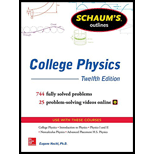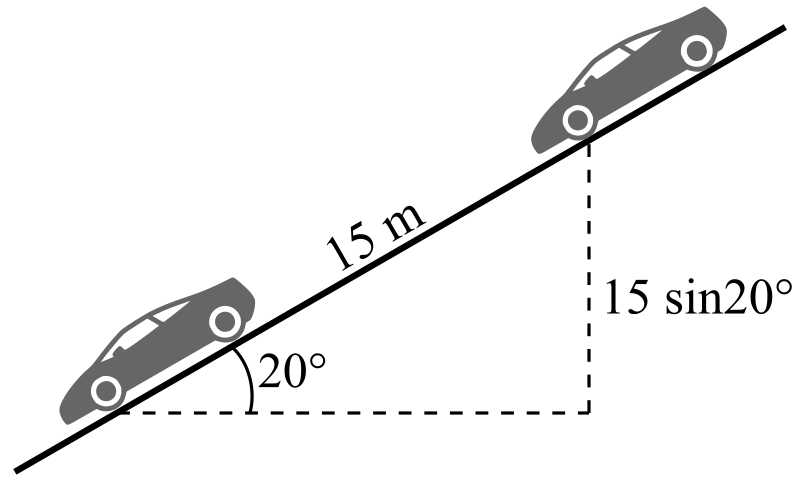
A 1200-kg car coasts from rest down a driveway that is inclined 20° to the horizontal and is 15 m long. How fast is the car going at the end of the driveway if (a) friction is negligible and (b) a friction force of 3000 N opposes the motion?
(a)
The speed of the car, of
Answer to Problem 46SP
Solution:
Explanation of Solution
Given data:
The mass of the car is
The angle of incline of the driveway with the horizontal is
The length of the driveway is
Formula used:
The expression for change in kinetic energy is written as
Here,
The expression for change in potential energy is written as
Here,
The expression for work energy theorem is written as
Explanation:
Draw the diagram for the motion of the car

There is no frictional force acting on the car, so there is no work done on the car. Therefore,
Substitute
The car started from rest. The initial velocity is zero. Also, the final position of the car is on the horizontal. Therefore,
Consider the diagram and the initial vertical distance covered is the sine component of the distance covered. Therefore,
Substitute
Conclusion:
The speed of the car at the end of the driveway with negligible frictional force is
(b)
The speed of the car, of
Answer to Problem 46SP
Solution:
Explanation of Solution
Given data:
The mass of the car is
The angle of incline is
The distance to the horizontal is
The frictional force is
Formula used:
The expression of change in kinetic energy is written as
Here,
The expression of change in potential energy is written as
Here,
The expression of frictional work done is written as
Here,
The expression for the work energy theorem is written as
Explanation:
Draw the diagram for the motion of the car

Recall that the expression for the work energy theorem is written as
Substitute
The car started from rest. The initial velocity is zero. Also, the final position of the car is on the horizontal. Therefore,
Consider the diagram and the initial vertical distance covered is the sine component of the distance covered. Therefore,
The frictional force acts in the opposite direction of the displacement. Therefore,
Substitute
Conclusion:
The speed of the car with a frictional force of
Want to see more full solutions like this?
Chapter 6 Solutions
Schaum's Outline of College Physics, Twelfth Edition (Schaum's Outlines)
- How much energy is lost to a dissipative drag force if a 60-kg person falls at a constant speed for 15 meters?arrow_forwardAssume that the force of a bow on an arrow behaves like the spring force. In aiming the arrow, an archer pulls the bow back 50 cm and holds it in position with a force of 150 N. If the mass of the arrow is 50 g and the “spring” is massless, what is the speed of the arrow immediately after it leaves the bow?arrow_forwardA block of mass 0.250 kg is placed on top of a light, vertical spring of force constant 5 000 N/m and pushed downward so that the spring is compressed by 0.100 m. After the block is released from rest, it travels upward and then leaves the spring. To what maximum height above the point of release does it rise?arrow_forward
- At 220 m, the bungee jump at the Verzasca Dam in Locarno, Switzerland, is one of the highest jumps on record. The length of the elastic cord, which can be modeled as having negligible mass and obeying Hookes law, has to be precisely tailored to each jumper because the margin of error at the bottom of the dam is less than 10.0 m. Kristin prepares for her jump by first hanging at rest from a 10.0-m length of the cord and is observed to stretch the rope to a total length of 12.5 m. a. What length of cord should Kristin use for her jump to be exactly 220 m? b. What is the maximum acceleration she will experience during her jump?arrow_forwardA 537-kg trailer is hitched to a truck. Find the work done by the truck on the trailer in each of the following cases. Assume rolling friction is negligible. a. The trailer is pulled at constant speed along a level road for 2.30 km. b. The trailer is accelerated from rest to a speed of 88.8 km/h. c. The trailer is pulled at constant speed along a road inclined at 12.5 for 2.30 km.arrow_forwardA sled of mass 70 kg starts from rest and slides down a 10 incline 80 m long. It then travels for 20 m horizontally before starting back up an 8° incline. It travels 80 m along this incline before coming to rest. What is the magnitude of the net work done on the sled by friction?arrow_forward
- The system shown in Figure P5.43 is used to lift an object of mass m = 76.0 kg. A constant downward force of magnitude F is applied to the loose end of the rope such that the hanging object moves upward at constant speed. Neglecting the masses of the rope and pulleys, find (a) the required value of F, (b) the tensions T1, T2, and T3, and (c) the work done by the applied force in raising the object a distance of 1.80 m. Figure P5.43arrow_forwardA block of mass m = 5.00 kg is released from rest from point and slides on the frictionless track shown in Figure P5.36. Determine (a) the blocks speed at points and and (b) the net work done by the gravitational force on the block as it moves from point from to . Figure P5.36arrow_forwardA block of mass m = 2.50 kg is pushed a distance d = 2.20 m along a frictionless, horizontal table by a constant applied force of magnitude F = 16.0 N directed at an angle = 25.0 below the horizontal as shown in Figure P6.3. Determine the work done on the block by (a) the applied force, (b) the normal force exerted by the table, (c) the gravitational force, and (d) the net force on the block. Figure P6.3arrow_forward
- As shown in Figure P7.20, a green bead of mass 25 g slides along a straight wire. The length of the wire from point to point is 0.600 m, and point is 0.200 in higher than point . A constant friction force of magnitude 0.025 0 N acts on the bead. (a) If the bead is released from rest at point , what is its speed at point ? (b) A red bead of mass 25 g slides along a curved wire, subject to a friction force with the same constant magnitude as that on the green bead. If the green and red beads are released simultaneously from rest at point , which bead reaches point first? Explain. Figure P7.20arrow_forwardCite two examples in which a force is exerted on an object without doing any work on the object.arrow_forwardA block of mass m = 2.50 kg is pushed a distance d = 2.20 m along a frictionless horizontal table by a constant applied force of magnitude F = 16.0 N directed at an angle = 25.0 below the horizontal as shown in Figure P5.8. Determine the work done by (a) the applied force, (b) the normal force exerted by the table, (c) the force of gravity, and (d) the net force on the block. Figure P5.8arrow_forward
 University Physics Volume 1PhysicsISBN:9781938168277Author:William Moebs, Samuel J. Ling, Jeff SannyPublisher:OpenStax - Rice University
University Physics Volume 1PhysicsISBN:9781938168277Author:William Moebs, Samuel J. Ling, Jeff SannyPublisher:OpenStax - Rice University College PhysicsPhysicsISBN:9781285737027Author:Raymond A. Serway, Chris VuillePublisher:Cengage Learning
College PhysicsPhysicsISBN:9781285737027Author:Raymond A. Serway, Chris VuillePublisher:Cengage Learning Principles of Physics: A Calculus-Based TextPhysicsISBN:9781133104261Author:Raymond A. Serway, John W. JewettPublisher:Cengage Learning
Principles of Physics: A Calculus-Based TextPhysicsISBN:9781133104261Author:Raymond A. Serway, John W. JewettPublisher:Cengage Learning College PhysicsPhysicsISBN:9781305952300Author:Raymond A. Serway, Chris VuillePublisher:Cengage Learning
College PhysicsPhysicsISBN:9781305952300Author:Raymond A. Serway, Chris VuillePublisher:Cengage Learning Glencoe Physics: Principles and Problems, Student...PhysicsISBN:9780078807213Author:Paul W. ZitzewitzPublisher:Glencoe/McGraw-Hill
Glencoe Physics: Principles and Problems, Student...PhysicsISBN:9780078807213Author:Paul W. ZitzewitzPublisher:Glencoe/McGraw-Hill Physics for Scientists and Engineers, Technology ...PhysicsISBN:9781305116399Author:Raymond A. Serway, John W. JewettPublisher:Cengage Learning
Physics for Scientists and Engineers, Technology ...PhysicsISBN:9781305116399Author:Raymond A. Serway, John W. JewettPublisher:Cengage Learning





